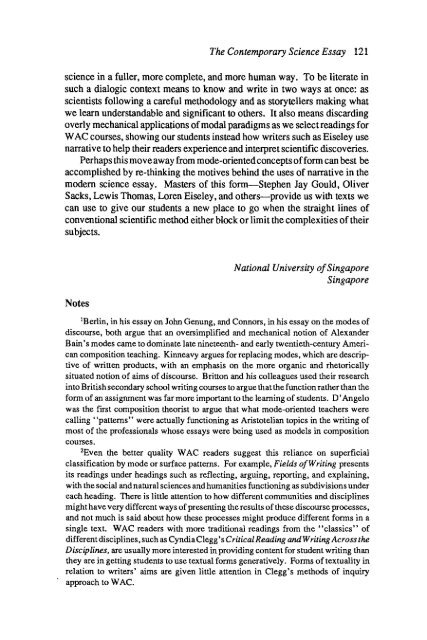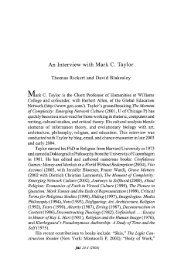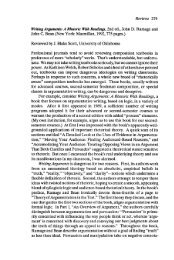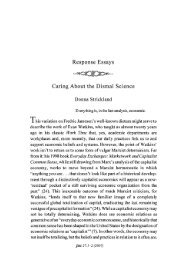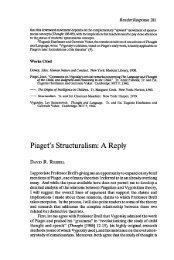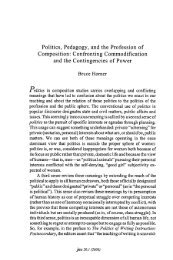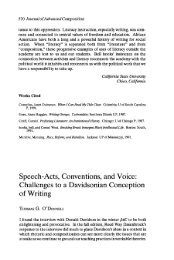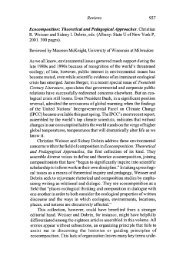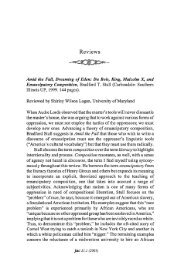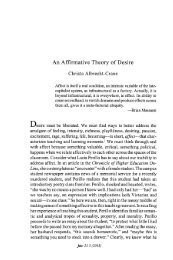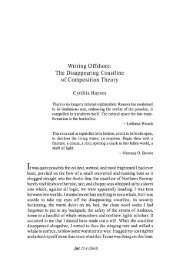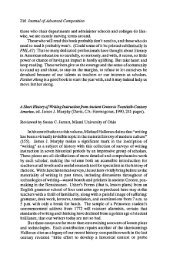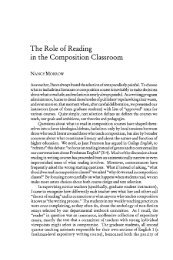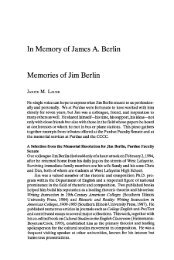Narrative Topic and the Contemporary Science Essay ... - JAC Online
Narrative Topic and the Contemporary Science Essay ... - JAC Online
Narrative Topic and the Contemporary Science Essay ... - JAC Online
Create successful ePaper yourself
Turn your PDF publications into a flip-book with our unique Google optimized e-Paper software.
The <strong>Contemporary</strong> <strong>Science</strong> <strong>Essay</strong> 121<br />
science in a fuller, more complete, <strong>and</strong> more human way. To be literate in<br />
such a dialogic context means to know <strong>and</strong> write in two ways at once: as<br />
scientists following a careful methodology <strong>and</strong> as storytellers making what<br />
we learn underst<strong>and</strong>able <strong>and</strong> significant to o<strong>the</strong>rs. It also means discarding<br />
overly mechanical applications of modal paradigms as we select readings for<br />
WAC courses, showing our students instead how writers such as Eiseley use<br />
narrative to help <strong>the</strong>ir readers experience <strong>and</strong> interpret scientific discoveries.<br />
Perhaps this move away from mode-oriented concepts of form can best be<br />
accomplished by re-thinking <strong>the</strong> motives behind <strong>the</strong> uses of narrative in <strong>the</strong><br />
modem science essay. Masters of this form-Stephen Jay Gould, Oliver<br />
Sacks. Lewis Thomas, Loren Eiseley, <strong>and</strong> o<strong>the</strong>rs-provide us with texts we<br />
can use to give our students a new place to go when <strong>the</strong> straight lines of<br />
conventional scientific method ei<strong>the</strong>r block or limit <strong>the</strong> complexities of <strong>the</strong>ir<br />
subjects.<br />
Notes<br />
National University of Singapore<br />
Singapore<br />
lBerlin, in his essay on John Genung, <strong>and</strong> Connors, in his essay on <strong>the</strong> modes of<br />
discourse, both argue that an oversimplified <strong>and</strong> mechanical notion of Alex<strong>and</strong>er<br />
Bain's modes came to dominate late nineteenth- <strong>and</strong> early twentieth-century American<br />
composition teaching. Kinneavy argues for replacing modes, which are descriptive<br />
of written products, with an emphasis on <strong>the</strong> more organic <strong>and</strong> rhetorically<br />
situated notion of aims of discourse. Britton <strong>and</strong> his colleagues used <strong>the</strong>ir research<br />
into British secondary school writing courses to argue that <strong>the</strong> function ra<strong>the</strong>r than <strong>the</strong><br />
form of an assignment was far more important to <strong>the</strong> learning of students. D' Angelo<br />
was <strong>the</strong> frrst composition <strong>the</strong>orist to argue that what mode-oriented teachers were<br />
calling "patterns" were actually functioning as Aristotelian topics in <strong>the</strong> writing of<br />
most of <strong>the</strong> professionals whose essays were being used as models in composition<br />
courses.<br />
2Even <strong>the</strong> better quality WAC readers suggest this reliance on superficial<br />
classification by mode or surface patterns. For example, Fields of Writing presents<br />
its readings under headings such as reflecting, arguing, reporting, <strong>and</strong> explaining,<br />
with <strong>the</strong> social <strong>and</strong> natural sciences <strong>and</strong> humanities functioning as subdivisions under<br />
each heading. There is little attention to how different communities <strong>and</strong> disciplines<br />
might have very different ways of presenting <strong>the</strong> results of <strong>the</strong>se discourse processes,<br />
<strong>and</strong> not much is said about how <strong>the</strong>se processes might produce different forms in a<br />
single text. WAC readers with more traditional readings from <strong>the</strong> "classics" of<br />
different disciplines, such as Cyndia Clegg's Critical Reading <strong>and</strong>W riting Across <strong>the</strong><br />
Disciplines, are usually more interested in providing content for student writing than<br />
<strong>the</strong>y are in getting students to use textual forms generatively. Forms of textuality in<br />
relation to writers' aims are given little attention in Clegg's methods of inquiry<br />
approach to WAC.


